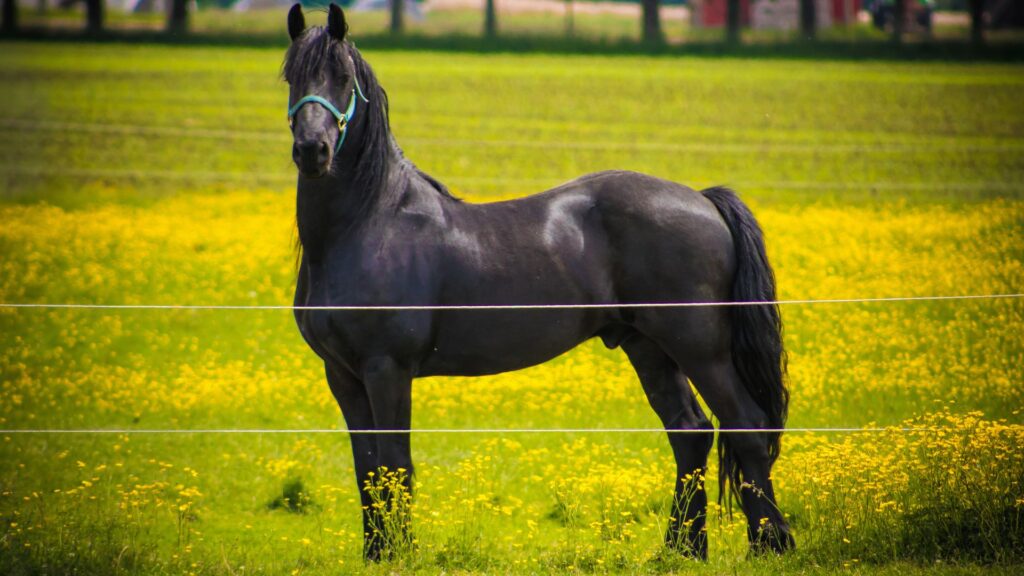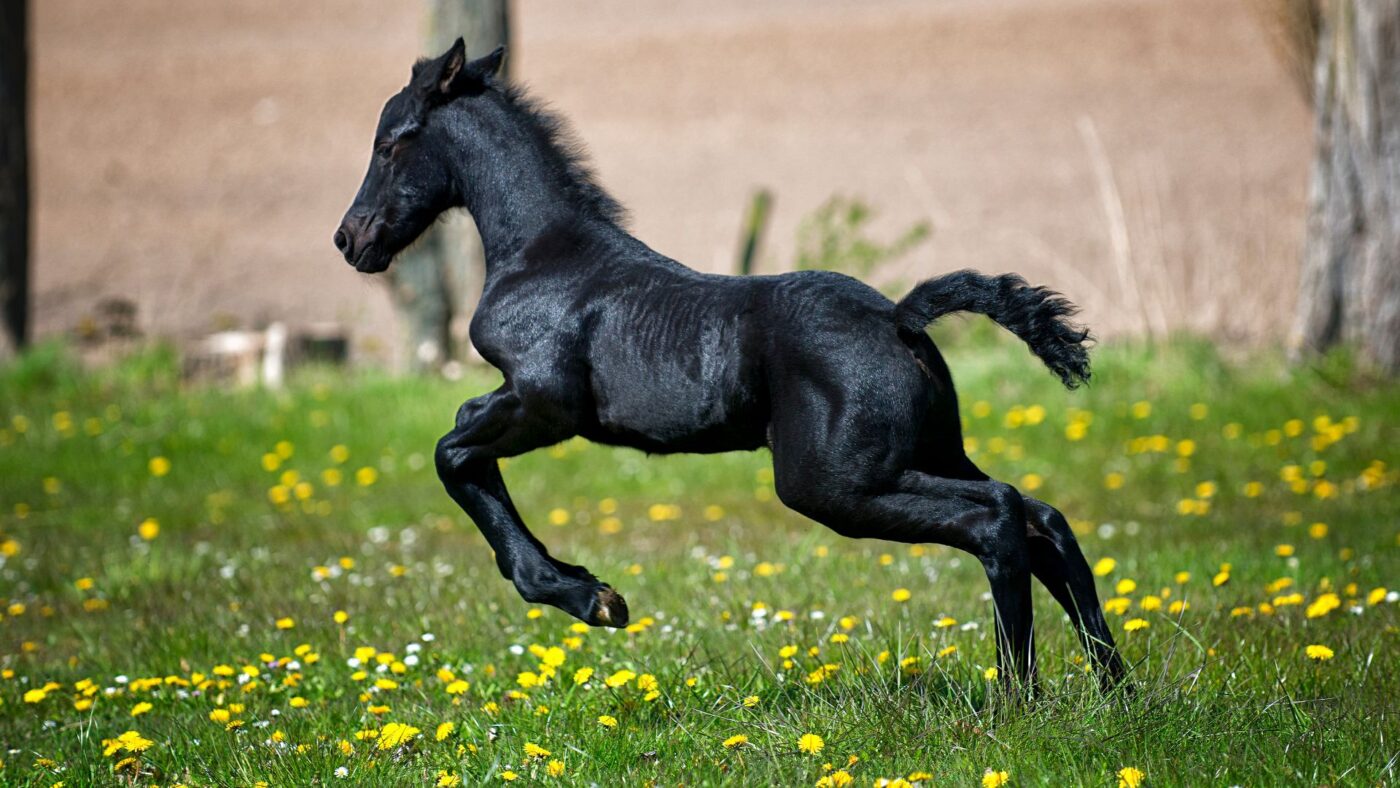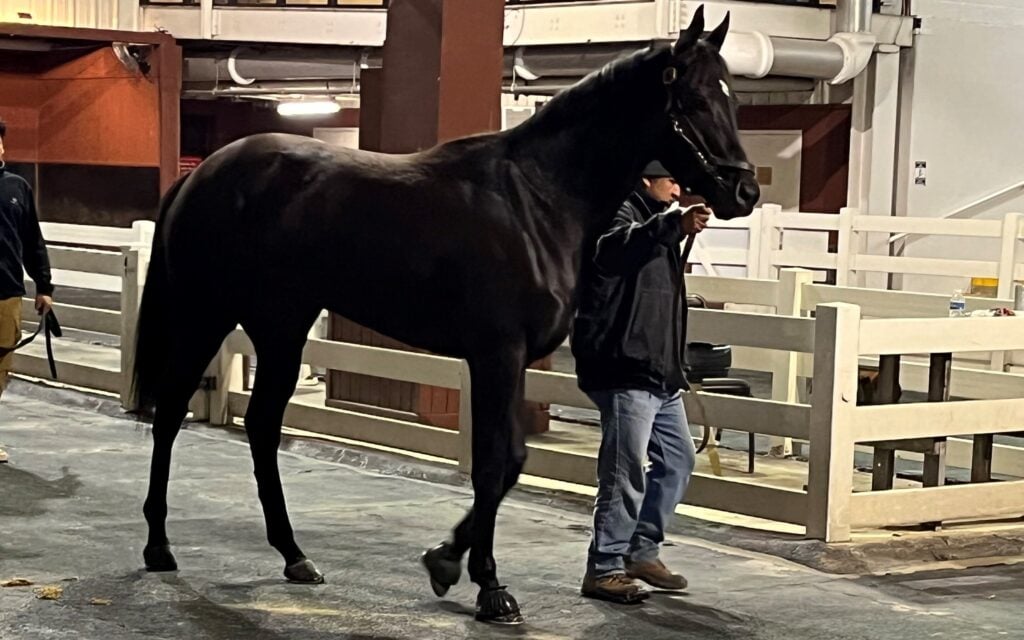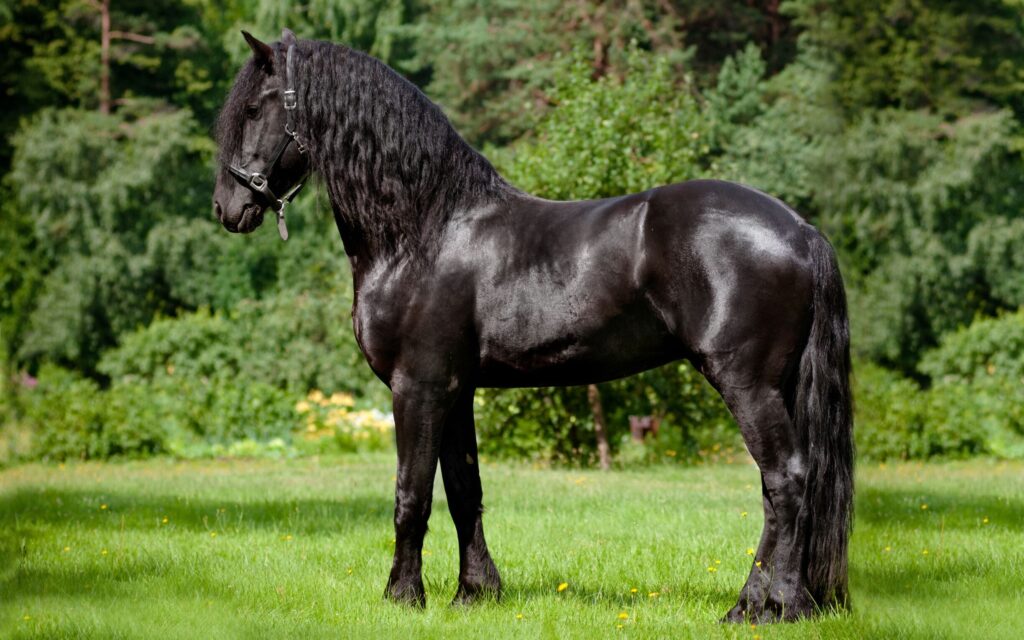Published on: February 8, 2024
Did you know that many black horses are actually born a unique shade of mouse gray? It’s true. This initial coat eventually sheds to reveal its true black color. Join me as we explore the essence of black horses, shedding light on their genetic roots, distinct traits, and interesting facts unique to them.
Drawing from a lifetime surrounded by horses and insights from research on equine topics, we’ll also celebrate the cultural and historical significance of black horses in equestrian pursuits, revealing why they captivate the hearts of horse enthusiasts worldwide.

The Genetics Behind Black Horses: Simplified
Key Genetic Factors:
- Dominant E+ Allele: Essential for the production of black pigment (eumelanin). Black horses have at least one E+ allele at the extension locus, making them E+E+, E+e, or E+ea.
- Agouti (A) Locus: Determines how the black pigment is distributed. The recessive allele (Aa) leads to a uniform black coat, while its absence allows for the black pigment to spread evenly, creating true black horses.
Breeding for Black:
- True-breeding black horses (AaAa E+E+) are ideal for breeders aiming for black foals.
- Breeding black horses can be challenging due to the possibility of heterozygous genotypes, which may result in chestnut foals.
Fading vs. Non-Fading Blacks:
- Some black horses’ coats fade or redden in the sun, a phenomenon not fully understood genetically but observed in other animals as well.
- The distinction between fading and non-fading blacks is notable, though the exact genetic basis remains a mystery.
The Red Factor Test:
- A molecular genetics test that differentiates the E+ allele from recessive alleles (e and ea), useful for breeders targeting black horses.
- Helps determine the genetic predisposition of horses for producing black or chestnut foals.
Takeaway: Understanding the genetics of black horses involves recognizing the role of the E+ allele and the agouti locus in determining a horse’s coat color. While breeding for black horses can be complex due to genetic variability, advancements like the red factor test offer valuable insights for breeders.

Black Horse Breeds: An Overview
Discover the horse breeds renowned for their striking black coats. Each breed carries unique characteristics and a rich history, making them favorites among equestrians.
Friesian
- Origin: Netherlands
- Characteristics: Friesians are known for their graceful movement, long flowing mane and tail. They excel in dressage and driving.
Percheron
- Origin: France
- Characteristics: A draft breed with a strong build and calm demeanor, Percherons are versatile and used for farm work, driving, and under saddle.
Murgese
- Origin: Italy
- Characteristics: Robust and hardy, Murgese horses are known for their endurance and agility, often used in equestrian sports and as work horses.
Andalusian
- Origin: Spain
- Characteristics: Elegant and athletic, Andalusians possess a striking appearance with a strong, compact body, excelling in classical dressage.

Lusitano
- Origin: Portugal
- Characteristics: Closely related to the Andalusian, Lusitanos are revered for their bravery, athleticism, and skill in traditional Portuguese bullfighting.
Mérens
- Origin: France
- Characteristics: A smaller mountain breed, Mérens are sturdy, sure-footed, and known for their friendly nature, ideal for trail riding and driving.
Dales Pony
- Origin: United Kingdom
- Characteristics: Strong and durable, with excellent stamina, Dales Ponies are versatile, excelling in driving, riding, and competitive events.
Quarter Horse
- Origin: United States
- Characteristics: Renowned for their speed over short distances, Quarter Horses are versatile, excelling in rodeo events, ranch work, and as family pets.
Thoroughbred
- Origin: United Kingdom
- Characteristics: Best known for horse racing, Thoroughbreds are athletic, with a spirited temperament and a passion for speed and competition.
Morgan
- Origin: United States
- Characteristics: Morgans are known for their versatility, friendly disposition, and strong, compact build, excelling in driving, riding, and as show horses.

Caring for Black Horses: Grooming and Coat Color Preservation
Caring for black horses involves a dedicated approach to grooming and coat maintenance to ensure their striking black coats remain vibrant and healthy. Here are tips and strategies for both grooming and preserving the rich color of black horses:
Regular Grooming:
- Frequent brushing not only enhances the coat’s natural shine but also stimulates blood flow, improving overall coat health. Use a soft brush to add gloss and remove dust and dirt that can dull the coat.
Sun Protection:
- Black coats are prone to fading under the sun’s harsh rays. Limiting exposure during peak sunlight hours and using UV-protective fly sheets can help maintain the coat’s dark color. Consider applying equine-friendly sunblock to sensitive areas, especially if your horse has a thin coat or white markings.

Nutritional Support:
- A diet rich in essential fatty acids, vitamins, and minerals supports skin and coat health. Incorporating flaxseed, chia seeds, or specialized supplements can enhance the coat’s shine and prevent dullness.
Hydration:
- Keeping your horse well-hydrated is crucial for maintaining a healthy coat. Ensure constant access to clean, fresh water to support overall health and skin condition.
Dietary Supplements:
- Consider adding specific supplements designed to enhance coat color. Products containing paprika, a natural source of antioxidants, can help maintain the dark pigment of the coat. However, consult with a veterinarian before introducing any new supplement, as paprika can test positive in-competition drug tests.
Turnout Management:
- When possible, manage turnout times to avoid prolonged sun exposure. Early morning or late afternoon turnouts reduce the risk of coat fading.
Bathing Practices:
- Use shampoos and conditioners formulated for black or dark-colored coats. These products often contain color enhancers that help maintain the coat’s rich color. Avoid over-bathing, as it can strip natural oils from the skin and coat, leading to dryness and potential fading.

Famous Black Horses in History and Culture
Here’s a look at some of the most iconic black horses, both real and fictional, that have left an indelible mark on history, literature, and film:
Bucephalus
- The legendary steed of Alexander the Great, known for his unmatched bravery and the deep bond he shared with one of history’s greatest conquerors. Bucephalus’s name and legacy symbolize loyalty and greatness in battle.
Black Beauty
- The protagonist of Anna Sewell’s novel, this gentle and noble horse, brought attention to the welfare of horses in the 19th century. Black Beauty’s story is a poignant reminder of the need for kindness and empathy towards animals.
The Black Stallion
- A wild and spirited Arabian horse from Walter Farley’s novels and the 1979 film adaptation. The Black Stallion, or “The Black,” forms a profound connection with Alec Ramsey, showcasing the extraordinary bond that can form between humans and horses.
Black Hawk
- A Morgan horse known for his significant impact on the breed, Black Hawk was celebrated for his beauty, strength, and speed. Born in the 19th century, his lineage continues to influence the Morgan breed today.
Black Jack
- The last Quartermaster-issue U.S. Army horse, known for his role as a caparisoned (riderless) horse in military funerals. Black Jack participated in the funerals of Presidents John F. Kennedy, Herbert Hoover, and Lyndon B. Johnson, symbolizing honor and service. Army serial number 2V56
Goliath
- From the 1985 film “Ladyhawke,” Goliath is the loyal companion of the dark and mysterious Etienne Navarre. This powerful black horse plays a crucial role in the film’s adventure, embodying loyalty and the fight for love against all odds.

10 Best Black Horse Names
Choosing a name for a black horse can be a delightful challenge, aiming to match their elegance, strength, and unique personality. Here’s a list of my ten favorite names inspired by the mystique and beauty of black horses:
- Midnight – Evoking the deep, serene beauty of the night sky, perfect for a horse with a coat as dark as the night.
- Shadow – For the horse that moves with grace and stealth, always by your side like a faithful shadow.
- Eclipse – A powerful name for a horse whose presence is as rare and captivating as a solar eclipse.
- Onyx – Inspired by the shiny, black gemstone, symbolizing strength and the beauty of their glossy coat.
- Raven – After the intelligent and mysterious bird known for its black plumage, it is ideal for a horse with a smart and enigmatic personality.
- Sable – Reflecting a horse with a coat as dark and luxurious as the fur of the sable.
- Storm – For a spirited horse whose energy and power are as commanding as a stormy night.
- Jet – Named after the deep black, lignite mineraloid, perfect for a horse with a sleek, black coat.
- Nero – Italian for “black,” a classic and strong name that directly nods to their striking coat color.
- Phantom – For the horse with a mysterious allure, moving with a presence that’s both captivating and elusive.

FAQs: Understanding Black Horses
Are all black horses born black?
No, many black horses are born with a mouse-gray coat that sheds over time to reveal their true black color. This transformation is part of their unique genetic makeup.
What is the difference between a “fading black” and a “non-fading black” horse?
“Fading blacks” experience a lightening of their coat color due to sun exposure, often turning a brownish shade in summer. “Non-fading blacks” retain their deep, dark black color throughout the year, regardless of sun exposure.
Can any horse breed have a black coat?
While many horse breeds can produce black-coated individuals, certain breeds like the Friesian, Percheron, and Murgese are particularly known for their striking black coats.
How can I prevent my black horse’s coat from fading?
Limiting sun exposure, using UV-protective fly sheets, and applying equine-friendly sunblock can help. Additionally, incorporating specific supplements and a balanced diet can support coat health and color.

Conclusion: The Enduring Allure of Black Horses
Black horses have long captivated us with their elegance, mystery, and strength. They stand as symbols of power and beauty, from historical legends like Bucephalus to beloved characters such as Black Beauty.
Caring for these horses requires a dedicated approach to maintain their lustrous coats. Yet, the effort is a small price to pay for the joy and companionship these animals bring. As we reflect on the contributions of black horses to culture, history, and personal lives, it’s clear that they deserve our utmost respect and admiration.
Call to Action: Let’s honor the legacy of black horses by learning more about them, sharing their stories, and advocating for their welfare. Whether you’re an equestrian enthusiast or simply admire their grace, your engagement can help ensure these magnificent animals continue to enchant future generations.
Additional Resources: For those interested in delving deeper into the world of black horses, a wealth of information awaits. Consider exploring the following resources:
- Books and Literature: From “Black Beauty” by Anna Sewell to “The Black Stallion” series by Walter Farley, literature offers a profound insight into the lives and adventures of black horses.
- Equestrian Organizations: Join local and national equestrian organizations to connect with fellow horse lovers, participate in events, and support horse welfare initiatives.
- Online Forums and Communities: Engage with online communities dedicated to horse care, breeding, and equestrian sports. These platforms are excellent for sharing experiences and advice.
- Documentaries and Films: Watch documentaries and films featuring black horses to appreciate their beauty and learn about their impact on cultures around the world.

About the Author: Miles Henry
Lifelong Horseman | Racehorse Owner | Published Author
Miles Henry brings over 25 years of hands-on experience training and owning Thoroughbred racehorses. Raised with Quarter Horses and Appaloosas, he’s spent a lifetime learning from horses—on the track, in the barn, and in the field. Today, he runs a small but successful racing stable in Louisiana and shares real-world insights on HorseRacingSense.com, helping horse owners, fans, and bettors navigate the sport with confidence.
📚 Books: View Miles’s books on Amazon »
🎧 Podcast Guest: Animal Tales Ep. 32 |
YouTube Interview
📩 Newsletter: Sign up for racing tips and horse care advice »
🔗 Follow Miles:
Twitter |
Facebook |
YouTube

